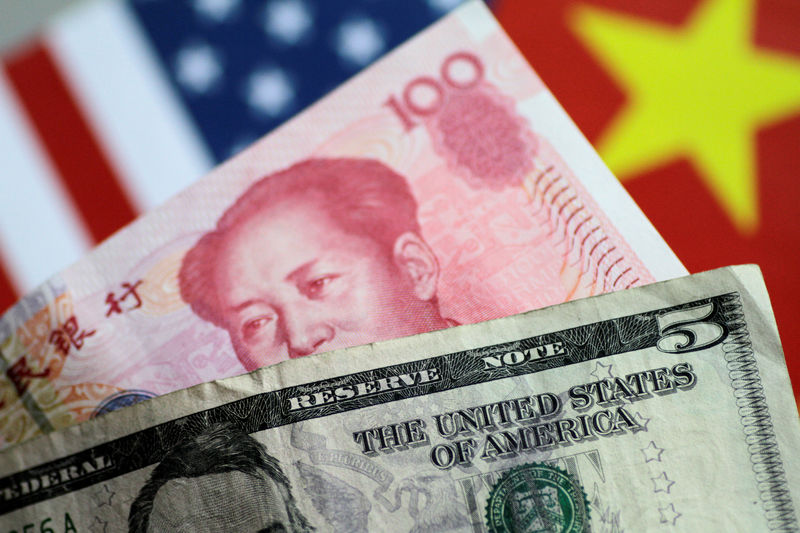WASHINGTON (Reuters) - The U.S. government has determined that China is manipulating its currency and will engage with the International Monetary Fund to eliminate unfair competition from Beijing, U.S. Treasury Secretary Steven Mnuchin said in a statement on Monday.
The move brings already tense U.S.-Chinese relations to a boil and fulfills U.S. President Donald Trump's promise to label China a currency manipulator for the first time since 1994.
The U.S. action follows China allowing its yuan to weaken past the key 7-per-dollar level on Monday for the first time in more than a decade. Beijing later said it would stop buying U.S. agricultural products, inflaming a yearlong trade war with the United States.
The sharp 1.4% drop in the yuan comes days after U.S. President Donald Trump stunned financial markets by vowing to impose 10% tariffs on the remaining $300 billion of Chinese imports from Sept. 1, abruptly breaking a brief ceasefire in a bruising trade war that has disrupted global supply chains and slowed growth.
The news knocked the dollar sharply lower and bolstered the price of gold .
The Treasury Department said a statement from the People's Bank of China (PBOC) on Monday made clear that Chinese authorities had ample control over the yuan exchange rate.
The PBOC said Monday it would "continue to ... take necessary and targeted measures against the positive feedback behavior that may occur in the foreign exchange market."
"This is an open acknowledgement by the PBOC that it has extensive experience manipulating its currency and remains prepared to do so on an ongoing basis," the Treasury statement said.
It said China's actions violate its commitment to refrain from competitive devaluation as part of the Group of 20 industrialized countries. Treasury said it expected China to adhere to those commitments and not target China's exchange rate for competitive purposes.
U.S. law sets out three criteria for identifying manipulation among major trading partners: a material global current account surplus, a significant bilateral trade surplus with the United States, and persistent one-way intervention in foreign exchange markets.
After determining a country is a manipulator, the Treasury is required to demand special talks aimed at correcting an undervalued currency, with penalties such as exclusion from U.S. government procurement contracts.
The U.S. Treasury had designated Taiwan and South Korea as currency manipulators in 1988, the year that Congress enacted the currency review law. China was the last country to get the designation, in 1994.
In May, the Treasury had refrained from declaring China a currency manipulator based on new tougher criteria measuring a country's global current account surplus, along with persistent one-way intervention and a large bilateral trade surplus with the United States.

In the report, however, Treasury kept China on an enhanced monitoring list due to a "misalignment and undervaluation of the RMB relative to the dollar."